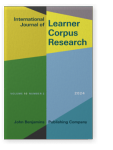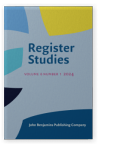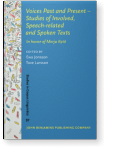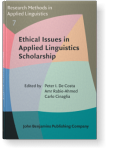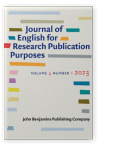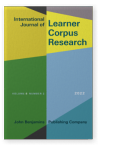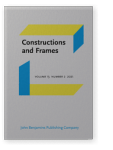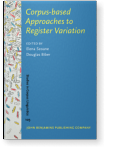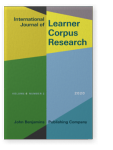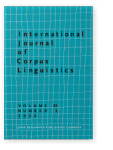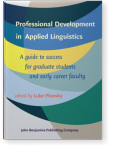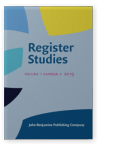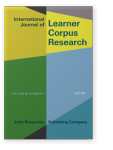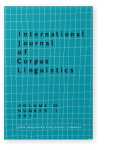Tove Larsson
List of John Benjamins publications for which Tove Larsson plays a role.
Journals
Titles
Cumulative Knowledge Building in Learner Corpus Research
Edited by Tove Larsson and Douglas Biber
Special issue of International Journal of Learner Corpus Research 11:1 (2025) v, 244 pp.
Voices Past and Present - Studies of Involved, Speech-related and Spoken Texts: In honor of Merja Kytö
Edited by Ewa Jonsson and Tove Larsson
[Studies in Corpus Linguistics, 97] 2020. xiii, 348 pp.
Subjects Corpus linguistics | Discourse studies | English linguistics | Germanic linguistics | Historical linguistics | Pragmatics
2025 Encouraging cumulative knowledge building as normal practice in (learner) corpus research: Encouraging cumulative knowledge building as normal practice in (learner) corpus research Cumulative Knowledge Building in Learner Corpus Research, Larsson, Tove and Douglas Biber (eds.), pp. 1–16 | Introduction
2024 Comparing theory-based models of grammatical complexity in student writing Cumulative Knowledge Building in Learner Corpus Research, Larsson, Tove and Douglas Biber (eds.), pp. 145–177 | Article
The present study tests the empirical adequacy of competing models of grammatical complexity in university student writing, based on analysis of disciplinary texts from L1-English and L2-English students. The results show that grammatical complexity in student writing must be treated as a… read more
2024 Chapter 1. A taxonomy of questionable research practices in quantitative humanities Ethical Issues in Applied Linguistics Scholarship, De Costa, Peter I., Amr Rabie-Ahmed and Carlo Cinaglia (eds.), pp. 10–27 | Chapter
A growing body of research has begun to address ethical issues in the context of Applied Linguistics (e.g., De Costa, 2016; Isbell et al., 2022). One of the messages inherent in this line of inquiry is that ethical concerns are embedded throughout the research cycle from study conceptualization… read more
2024 The effect of linguistic and extralinguistic features on EFL adverb placement: A partial replication study of Larsson et al. (2020) International Journal of Learner Corpus Research 10:2, pp. 338–364 | Article
Larsson et al. (2020) emphasize the importance of taking linguistic variables (e.g., verb type) into consideration in studies of adverb placement. This study looks at the positional distribution of 15 epistemic adverbs from texts written by L1 Turkish, German, and English students, with the aim… read more
2023 Examining novice writers’ perceptions of formality Journal of English for Research Publication Purposes 4:1, pp. 29–55 | Article
Adherence to standards pertaining to formality remains important for novice academic writers wishing to write within the scientific community. However, due to its elusive nature, it may not be clear what “formal” really means. This study investigates what affects novice writers’ perceptions of… read more
2022 On learner characteristics and why we should model them as latent variables International Journal of Learner Corpus Research 8:2, pp. 237–260 | Article
Learner corpus research has a strong tradition of collecting metadata. However, while we tend to collect rich descriptive information about learners on directly measurable variables such as age, year of study, and time spent abroad, we frequently do not know much about learner characteristics… read more
2021 Testing the Principle of No Synonymy across levels of abstraction: A constructional account of subject extraposition Constructions and Frames 13:2, pp. 230–262 | Article
This corpus-based study tests the Principle of No Synonymy across levels of abstraction by examining the syntactic realizations of subject extraposition (e.g., it is important to, it seems that), and by investigating at which level(s) of formal description a difference in form also entails a… read more
2021 Chapter 9. On the importance of register in learner writing: A multi-dimensional approach Corpus-based Approaches to Register Variation, Seoane, Elena and Douglas Biber (eds.), pp. 235–258 | Chapter
The present study explores the relative importance of register in learner writing vis-à-vis learner-internal factors such as first-language background. Using multi-dimensional analysis, the study looks at learner and native-speaker student writing from two registers (argumentative essays and… read more
2020 Chapter 1. Voices of English: Tapping into records past and present Voices Past and Present - Studies of Involved, Speech-related and Spoken Texts: In honor of Merja Kytö, Jonsson, Ewa and Tove Larsson (eds.), pp. 1–8 | Chapter
2020 Inter-rater reliability in Learner Corpus Research: Insights from a collaborative study on adverb placement International Journal of Learner Corpus Research 6:2, pp. 237–251 | Article
In Learner Corpus Research (LCR), a common source of errors stems from manual coding and annotation of linguistic features. To estimate the amount of error present in a coded dataset, coefficients of inter-rater reliability are used. However, despite the importance of reliability and internal… read more
2020 Adverb placement in EFL academic writing: Going beyond syntactic transfer International Journal of Corpus Linguistics 25:2, pp. 156–185 | Article
The present study looks at adverb placement in expert writing and in first-language and second-language novice spoken and written production. The extent to which first-language (L1) transfer is still present in advanced learners’ written production is also investigated. The study uses data from… read more
2020 Chapter 5. Towards achieving work-life balance in academia: Comments and personal essays from six applied linguists Professional Development in Applied Linguistics: A guide to success for graduate students and early career faculty, Plonsky, Luke (ed.), pp. 49–64 | Chapter
The competing demands of teaching, research, and service seem to never end. Consequently, as academics, we often find ourselves feeling unable to realize our professional goals while also maintaining a life outside of work. Recognizing that there is no one-size-fits-all way to achieve or… read more
2019 Grammatical stance marking across registers: Revisiting the formal-informal dichotomy Register Studies 1:2, pp. 243–268 | Article
There are sets of grammatical stance markers that are morphologically and semantically related, but that differ with regard to their syntactic realization (e.g., importantly, it is important that and the importance of). Little attention has, however, been paid to how these pattern across… read more
2019 Extraposition in learner and expert writing: Exploring (in)formality and the impact of register International Journal of Learner Corpus Research 5:1, pp. 33–62 | Article
Subject extraposition (e.g. it is important to remember) is generally considered to be a formal construction that learners, whose writing is often said to be overly informal, have been found to struggle with. This study investigates to what extent register and text type can be used to explore… read more
2017 The importance of , it is important that or importantly ? The use of morphologically related stance markers in learner and expert writing International Journal of Corpus Linguistics 22:1, pp. 57–84 | Article
The ability to successfully position oneself in relation to one’s claims through the use of stance markers is of central importance for academic writers. This study, which uses data from one expert corpus (LOCRA) and three learner corpora (ALEC, VESPA and BATMAT), investigates the use of… read more
Achieving stability in corpus-based analysis of word types International Journal of Corpus Linguistics: Online-First Articles | Article
Rank-ordered lists of word types are ubiquitous in corpus linguistics and applied linguistics. Word lists are commonly developed as aids for language teaching and learning, vocabulary testing, and language description. Yet, these lists are often produced and used without evaluation of their… read more
